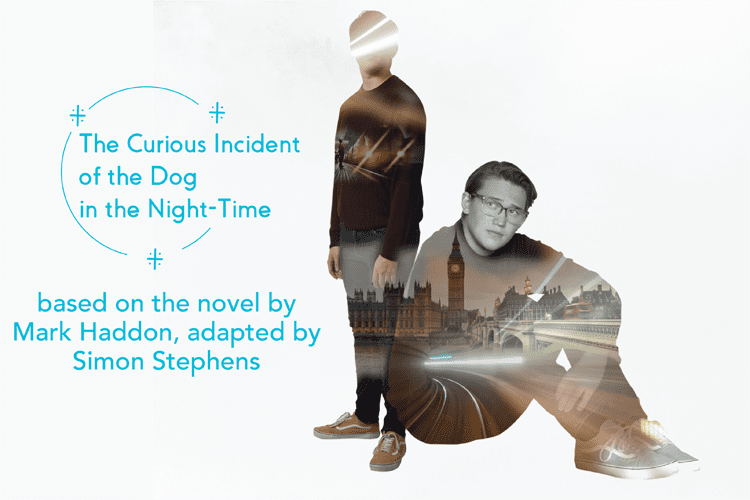
Explore the Extraordinary Mind of Christopher Boone
By Mary Murphy, 5280 Magazine (Read the original.)
The Boulder Ensemble Theatre Company is performing the Tony Award-winning play The Curious Incident of the Dog in the Night-Time, which celebrates neurological diversity of the human mind.
Christopher John Francis Boone does not like the color yellow. He likes space and stars and science. He does not like hugging. He likes his pet rat, Toby. He likes math. He does not like when people yell, and he does not like strangers. Within the first few scenes in this play, he is introducing us to prime numbers, his daily habits, probability puzzles, and his idea for writing a murder mystery novel—the story that is about to unfold to the audience through Christopher’s eyes, complete with the quiet feelings of a father/son relationship and the overwhelming terror of London’s tube.
This week, the Boulder Ensemble Theatre Company (BETC) will close its 13th season with The Curious Incident of the Dog in the Night-Time, a play written by Simon Stephens based on the 2003 book by Mark Haddon, that in 2013 won seven Olivier Awards, including Best New Play, and a 2015 Tony Award for Best Play.
Accolades aside, the play has grown popular due to its storytelling and true-to-life character development of the protagonist Christopher Boone, who is mathematically gifted (he can recite the powers of two in his head), has a fear of certain social interactions (doesn’t like to be touched), and has other mannerisms that portray him as an autistic savant. The play follows the story of Boone as he struggles with everyday emotional challenges and alterations of his schedule, beginning with the opening scene in which he discovers his neighbor’s dog, Wellington, has been stabbed with a garden fork. As he sets out to solve the mystery of Wellington’s murder, he uncovers a mysterious family secret and makes a host of other important discoveries—about his family, others, and himself.
The play’s interpretation of many different mental disorders, including Asperger’s, dyslexia, and other mental processing abilities, is a celebration of neurodiversity in its own right. Stephen Weitz, the BETC’s producing artistic director, says their production was inspired by the main character’s unique world perspective, with the technological design of the stage and lighting forcing the audience inside the mind of the neurodivergent character throughout the play.
With that in mind, the BETC set out to make the play accessible to neurodiverse audiences. The company will perform two relaxed performances, which are modified to accommodate those with autism or sensory processing disorders, so they can enjoy the production in a safe and unique way. “We want members of the neurodiverse population to see a story like theirs on stage,” Weitz says. “So we wanted to make that a priority…to be inclusive of people who may not react well to certain stimulus.” During these performances, house lights will be left at a certain level, adjustments will be made in extreme moments of light or sound, and the audience is welcome to move around the theater, or leave and return as needed. These special showings will be performed on May 4 at 2 p.m. and May 8 at 7:30 p.m.
Producing this play is a massive undertaking. It was once thought to be unstageable due to the sheer amount of scene and dialogue that takes place within Christopher’s brain—making them the BETC the first theater company in Colorado to perform it. “I was absolutely convinced that my novel was unfilmable and unstageable,” says author Mark Haddon, “Simon’s genius proved me utterly wrong.”
Because the contents of the book take place largely inside Christopher’s thoughts, the playwright had to morph Christopher’s feelings, rapid-fire observations about the outside world, and large chunks of mathematical theories into a cohesive script and timeline that was performable, yet still reflected the spirit of the book. “One of exciting things about this production is it has a large ensemble component: a lot of movement and physical representation of events that happen,” Weitz says. “Our cast is using choreography to create the world around Christopher—they understand they are not just playing their individual parts, but that they are part of a larger world.”
And the production itself is huge—in the two-hour play, 10 actors will portray over 30 different roles. The company is working with a production designer from New York to help with set design, and even enlisted local sound artist Jonathan Howard to write the play’s music, which is 100 percent original composition. “It’s our biggest undertaking in terms of the overall production values—there’s a lots of costuming and design elements, and we are building the entire production from scratch,” says Weitz.
This unique and immersive production of The Curious Incident of the Dog in the Night-Time is sure to push your emotional and sensory buttons, yet at the same time give audience members a greater understanding of all different types of people. “That’s the power of what theater can do,” Weitz says. “To create that empathic gateway in showing the character’s experience.”
